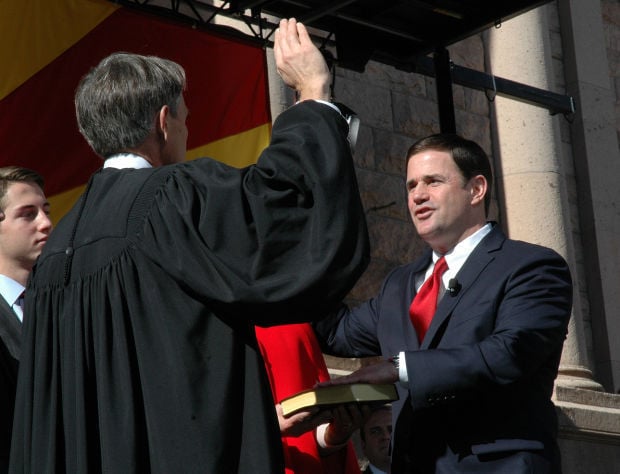Of course nothing is sacred in politics.
Why should the state’s highest court be any different?
And yet, there’s something unseemly about the deal moving through the Legislature that would add two seats to the state’s Supreme Court.
Three unseemly things, actually.
The bill would expand the court from five to seven justices even though no one on the court or recently retired from it is saying that’s necessary.
The bill is winning support via horse-trading: Basically, legislative leaders promise to restore previously cut funding and give judges raises if the Supreme Court will not oppose the expansion.
The bill would give Gov. Doug Ducey two more appointments, allowing him to effectively “pack the court,” as the old phrase goes, by naming three of seven justices in his first year and a half in office.
“The only reason I can see that would be a basis to increase the Supreme Court would be a political reason,” retired chief justice Charles “Bud” Jones told me last week. “There can be no other. It’s a court-packing arrangement for political influence.”
Jones, by the way, is a Republican, appointed by then-Gov. Fife Symington in 1996. I interviewed four of the last five chief justices — two Republicans, a Democrat and an independent. None supports the proposed change, though not all were as quick to find a political motive as Jones was.
But, of course, none is sitting in Scott Bales‘ chair. Bales, the Supreme Court’s chief justice, says that none of the current justices support expanding the court as a stand-alone deal, but if trading horses is what it takes to get necessary funding for the judicial branch, he’ll do it.
The deal struck with legislators would increase funding for the courts by about $10 million, $6 million of which restores money previously “swept” by the Legislature, $3 million for children’s dependency cases, and almost $1 million for tech upgrades. It would also increase judges’ salaries by 3 percent.
“I have agreed to support a package — suggested by representatives of other branches of government — that combines needed court funding, salary increases and two new justices,” Bales wrote in a piece for the Arizona Republic. “I did so because I think that on balance it would strengthen Arizona’s courts in administering justice.”
The idea of having to negotiate a “package” to simply meet the needs of an equal branch of government is what most bothers former chief justice Thomas Zlaket, a Tucson attorney.
“I like this chief justice, I have great respect for him,” Zlaket said. “I think it’s a bad idea for the court to negotiate this kind of a deal with the Legislature.”
“People seem to forget that this is an independent branch,” he said of the judiciary. “I don’t like the idea of having to negotiate and give a quid pro quo for what should be normal, fair government functioning.”
Zlaket, who served as chief justice for five years until 2002, was a Republican at the time and is an independent now. Fellow former chief justices Stanley Feldman, a Democrat, and Rebecca White Berch, a Republican, shared his concerns. And, despite their roots in different parties, they suspect the real motive is to win decisions more favorable to the Republican legislative leadership and to the governor.
“It’s an obvious political attempt by the governor to increase his political power by expanding the court and getting two additional appointments,” Feldman said. “This is an attempt to expand the court when the court doesn’t need an expansion.”
The governor’s spokesman, Daniel Scarpinato, told me there’s no such push from that office.
Nevertheless, Berch, who retired as chief justice last September, pointed out that the court functions well as it is, and she made the same accusation as Feldman, if more diplomatically.
“I don’t want to impute motive,” Berch said. “There may be those who think that if the court contained more friends, laws might be interpreted differently.”
Of course, the system doesn’t allow the governor to appoint just anyone, Scarpinato pointed out. He must choose from a slate picked by the Commission on Appellate Court Appointments.
But that commission has eight Republicans out of 13 members now. And more ominously, a bill passed last year gave the governor the right to replace those commissioners at will, even when their terms aren’t up. With that, he effectively gained control of the commission that gives him the names to pick from.
If you want to look for decisions the Legislature was unhappy with, look no further than the Supreme Court’s 2013 decision holding that the Legislature is obligated by a 2000 ballot measure to increase school funding annually. That’s the decision that led to a standoff between school districts and lawmakers and ultimately to next month’s vote on Prop. 123.
But the author of the measure to expand the court says it has nothing to do with old decisions, nothing to do with packing the court, and had no influence from the governor’s office. Rep. J.D. Mesnard, a Chandler Republican and self-described policy nerd, said he believes in spreading power, both among the branches and within the branches of government.
“To me, five people who have that much power is too few people,” he told me Friday.
With two new justices, he said, power is more dispersed. Also, he said, more justices means more opportunities for a more diverse Supreme Court.
True enough. But he also acknowledged that he would be less enthusiastic about the bill if a different governor were in office. And if I were betting, I’d guess that Ducey will come as close as possible in future appointments to replicating Clint Bolick, his recent Supreme Court pick who, like, Ducey, is heavily influenced by the Koch Bros.’ emphasis on the “economic liberty” of corporations and the rich.
In a hearing March 16, Sen. Martin Quezada, a Phoenix Democrat, suggested that perhaps the two new seats could be added, but not until after the next gubernatorial election, or the one after that, removing the partisan concerns from the debate.
It seems like a good idea to me, but it was met with scoffs from Republican Sen. John Kavanagh and others on the committee, who contrasted it with Democrats’ arguments in favor of holding a vote for President Obama’s pick to the U.S. Supreme Court.
To me, that was a decisive sign, because the situations are so different, and Quezada’s solution represented common sense.
I have no reason to doubt that Mesnard sincerely believes in the principal of spreading power this way. But the effect of the bill, intended or not, would be to allow Ducey to put two more loyalists on the court and cement one-party rule across all branches of state government.
On second thought, to call it unseemly is probably too generous. It’s a power grab.






